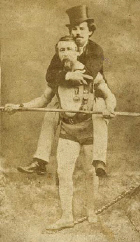Some children at play in a new-mown field, near Kensington gardens, horrid to relate, found the head of a female, with the skull split, the back part of it broken entirely off, and the nose cut away close to the face; the eyes were scooped out, and an iron spike was driven straight up the head through where the neck was amputated. To add to the horror of this occurrence, the head being extremely small, the children brought it, as a matter of curiosity, to show their parents. With a view to the discovery of the perpetrators of this deed, the circumstances were withheld from the neighbours for a time, when, in a lane adjoining the same field, the headless trunk was found extremely mutilated, the arms and thighs having been cut off close to the body. The limbs could not be traced. A hue-and-cry was now raised throughout the vicinity, where horror only kept pace with anxiety for a full investigation of all the circumstances. The result proved to be that some person, not having the fear of mischief before his eyes, had thus treated — a wooden doll!
— William Oxberry, ed., The Flowers of Literature, 1822





